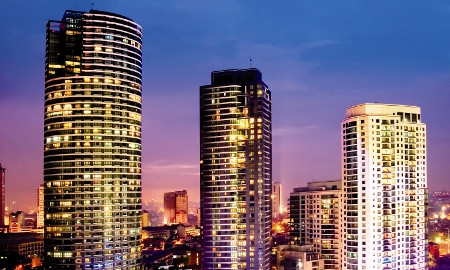When Benigno Aquino III became the 15th President of the Philippines in June 2010 the country entered into a state of socioeconomic and political stability. Since then the economy of this Asian archipelago has been strong with early signs indicating a steady growth for the foreseeable future.
The economy of the Philippines is currently ranked as the 40th largest in the world according to statistics released by the International Monetary Fund in 2012, when it was also recognised as one of the emerging markets of the world.
As a newly industrialized country, the economy of the Philippines has been steadily transitioning from an agricultural economy to one based more on services, manufacturing and, most importantly, the private sector. The estimated gross domestic product (GDP) for the Philippines in 2012 was over $424 billion. According to American multinational investment banking firm, Goldman Sachs, by the year 2050 the Philippines will be the 14th largest economy in the world.
The firm has previously included the Philippines in the Next 11, a projected list of the 11 countries with the highest potential of becoming the world’s largest economies in the 21st century. British multinational banking and financial services organization HSBC has also projected strong growth for the Filipino economy, with their figures indicating that by the year 2050 the economy of the Philippines will be the 16th largest in the world, fifth largest in Asia and largest in the South-East Asian region.
Together with Indonesia and Vietnam, the Philippines forms the Asian VIP (Vietnam, Indonesia, Philippines) market, an area which is proving to be increasingly attractive for private sector investors. According to Toshihiko Takamoto, the Lead Manager of the DIAM VIP Focus Fund, these areas are attractive for a number of reasons.
 | |  |
| Manuel V. Pangilinan, Chairman of the Board of PLDT | | TERESITA SY-COSON, Vice-Chairperson of SM Investments Corporation |
| | | |
 | |  |
| RAMON S. ANG, President and CEO of Philippines Airlines and President and COO of San Miguel Corporation | | Jaime Augusto Zobel de Ayala, Chairman and CEO of Ayala Corporation |
“To begin with, they have large populations. Indonesia has 230 million people, the Philippines 83 million and Vietnam nearly 80 million. On top of that, the average age is low, under 25, so you have a large, young and cheap labor force,” he says.
The well known economist then went on to talk about the potential for international investors, stating, “In the VIP markets, the influx of investment from overseas, which is indispensable for economic growth, has quickly grown in recent years. If the accumulation of capital continues in this way, an even longer period of growth can be expected.”
Mr. Takamoto finished by comparing the VIP market to the giants of Asian economy. “We expect these markets to follow a similar growth path to China and India. GDP per capita is very low still, in the range of $700-$1,700 across the three economies. VIP’s GDP per capita is approximately the same as Japan when it was during its high-growth period, and VIP is only in the initial stages of growth.”
The Philippines is surprisingly accessible for foreign investors, with both Filipino and English languages used officially. Mr. Takamoto believes the abundant human resources will support the continued growth of business process outsourcing (BPO) in areas such as IT services and call centers. There is also an abundance of engineers with the Philippines producing the largest annual number of graduates (50,000) from science and engineering universities out of all countries in the Association of Southeast Asian Nations (ASEAN).
Investment from the private sector has played an important role in the continued socio-economic development of the Philippines.
Family holding companies such as Ayala Group, Yuchengco Group, SM Investments Corporation, Lopez Group, DMCI Holdings, Metro Pacific Investments, Aboitiz Corporation, Robinsons Land Corporation, JG Summit Holdings Inc., and countless others have all contributed towards the redevelopment and continued growth of the Philippines on a social, political and economic level. These companies, and others, have become examples of successful entrepreneurship and innovation within the Filipino population.
Large multinational corporations have also played a part in the complete redevelopment of the country. Companies such as San Miguel, Jollibee, Insular Life, Megaworld, Rustan’s, Bench, Century Properties, BPI, Metrobank, Vista Land and many more have become ambassadors within the economy of the Philippines, opening the doors for other large multinationals by showing them the potential that lies within the Filipino economy.
Personally appointed by President Aquino in 2012, Arsenio Balisacan is the current Secretary of Socioeconomic Planning of the Philippines. Former Dean of the University of the Philippines School of Economics, Mr. Balisacan has become a key player in the continued growth and stability of the Filipino economy.
However, Secretary Balisacan is concerned not just with growth and stability, but with the distribution of wealth and the responsibility of government to ensure the development of the Philippines as a whole.
A recent statement from the Secretary reveals the aims set out by President Aquino: “Certainly, the Philippine economy is growing, but we need to make it grow faster and to sustain high growth for the long term. There is also no question that we need the growth to be more inclusive, across and within sectors and areas of the country.”





0 COMMENTS